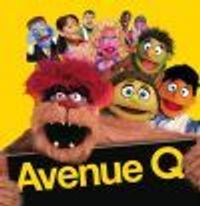GLORY DAYS reviews
westcoastdrama
Chorus Member Joined: 3/16/08
#75re: GLORY DAYS reviews
Posted: 5/6/08 at 9:43pmsingingbackup - what happened to your entire post. I thought you really illustrated the point.
#76re: GLORY DAYS reviews
Posted: 5/6/08 at 9:44pm
the D.C. critics loved it...
WHY, WHY, WHY DO PEOPLE KEEP SAYING THAT??????
SHOW US ONE, ONE,ONE
REVIEW FROM D.C. THAT WAS AN OUT AND OUT RAVE.
And why should we "cut them some slack because they are 23"? Did they cut the ticket price?
whatever2
Broadway Legend Joined: 8/25/06
#77re: GLORY DAYS reviews
Posted: 5/6/08 at 9:45pm
> Did they cut the ticket price?
OMG!!! ROFLMFAO!!!
(i learned that from my thirteen year old niece.)
too funny ... tho, to be fair, the discount codes were plentiful.
#78re: GLORY DAYS reviews
Posted: 5/6/08 at 9:55pm
Talkin' Broadway is a Pan:
A musical's route to opening on Broadway is a bit like high school: A gawky and impressionable show, nervous but expectant, is subjected to a withering battery of (hopefully) constructive torture and eventually emerges with a greater sense of self, ideally confident and ready to face the future. Sometimes, though, it exits the process as confused and troubled as it was when it entered. This, unfortunately, is the case with Glory Days.
But if this show is an almost complete failure, it's not a travesty you can take perverse pleasure in watching implode. That it's so full of promise and so empty of everything else isn't just the breaks - it's heartbreaking. This is not just because authors Nick Blaemire (music and lyrics) and James Gardiner (book) are, respectively, 23 and 24 years old, but because none of this ever had to happen...
http://www.talkinbroadway.com/world/GloryDays.html
-Nellie McKay on the 2006 Broadway production of The Threepenny Opera, in which she played Polly Peachum
#79re: GLORY DAYS reviews
Posted: 5/6/08 at 9:56pm
But I think it's really unfair for people here to be rejoicing in the bad reception the show is getting.
The hypocrisy of this statement is, well jaw dropping is the phrase that comes to mind first.
hockeynut2
Broadway Legend Joined: 1/31/06
#80re: GLORY DAYS reviews
Posted: 5/6/08 at 9:58pm
Here are the DC and other reviews.
Washington Post:
http://www.washingtonpost.com/wp-dyn/content/article/2008/01/24/AR2008012403364.html
DC Theatre Scene:
http://dctheatrescene.com/2008/01/23/glory-days/
Curtain Up:
http://www.curtainup.com/glorydaysdc.html
Theatermania:
http://www.theatermania.com/content/news.cfm/story/12559
Washington Times:
http://www.washingtontimes.com/article/20080125/ENTERTAINMENT/383912352/1007/entertainment
Washington City Paper:
http://www.washingtoncitypaper.com/display.php?id=34473
Potomac Stages:
http://www.potomacstages.com/TheaterArchives/SignatureArchive.htm#glory
Metro Weekly:
http://www.metroweekly.com/arts_entertainment/stage.php?ak=3194
TALKIN' BROADWAY
http://www.talkinbroadway.com/regional/dc/dc339.html
VARIETY:
http://www.variety.com/review/VE1117935895.html?categoryid=33&cs=1
Updated On: 5/6/08 at 09:58 PM
The Insider
Chorus Member Joined: 3/5/08
#82re: GLORY DAYS reviews
Posted: 5/6/08 at 9:59pmwestcoast--wanted to be more concise, so a new post is coming. Suffice to say if anyone wanted to do a search, the hypocrisy is very easy to find, though some here seem to be blind to it.
#83re: GLORY DAYS reviews
Posted: 5/6/08 at 10:20pm
Do we know if it will be Brantly or Isherwood?
Seems more up Isherwood's alley to be kinder.
#84re: GLORY DAYS reviews
Posted: 5/6/08 at 10:20pm
The New York Times review isn't working yet, but the paragraph... doesn't look like a pan.
The new musical “Glory Days” may be the youngest-feeling show about being young ever to land on Broadway. Granted, this callow portrait of four friends on the cusp of manhood doesn’t have the raging hormonal current or electrified anguish that made teenage cult favorites out of “Spring Awakening,” “Rent” and, four long decades ago, “Hair.” “Glory Days,” the maiden effort of Nick Blaemire (songs) and James Gardiner (book), is less about dangerous rebellion than about mild-mannered confusion. And it’s confusion as experienced not by sexually charged bohemians but by nice, nerdy middle-class kids struggling to understand why people grow apart as they grow up. Directed by Eric Schaeffer, the show and its characters are gawky, sincere, tentative, self-contradictory and given to home truths that are expounded on as if they were discoveries of new planets. This means that the production manages to seem fresh and seriously stale at the same time.
-Nellie McKay on the 2006 Broadway production of The Threepenny Opera, in which she played Polly Peachum
#85re: GLORY DAYS reviews
Posted: 5/6/08 at 10:20pm
Do we know if it will be Brantly or Isherwood?
Seems more up Isherwood's alley to be kinder.
AlwaysTheAssistantMD
Chorus Member Joined: 5/27/07
#88re: GLORY DAYS reviews
Posted: 5/6/08 at 10:26pmKevin Stites?
--http://www.benjaminadgate.com/
#90re: GLORY DAYS reviews
Posted: 5/6/08 at 10:33pm
the D.C. critics loved it...
Although nothing much actually happens in "Glory Days" -- the musical takes place in real time on the edge of a field that none of them ever was good enough to play on -- one is left with the somewhat contradictory feeling that nothing passes too quickly. Or, rather, Blaemire and Gardiner, in the effort to keep the production at a finger-snapping pace, end up placing too much emphasis on getting through a number, and then on to the next.
The result is that some of the vital things they're seeking to dramatize about these young men and the times in which they live never have the chance to sink in. In particular, the central character, Booth's Will, is asked in the production's final stages to make an unconvincing psychological pivot. He's required to absorb quite a lot of disorienting information and -- because it's time for his climactic song -- come to terms with his own evolving place in the world. Will needs more than a few bars of music to consider this, and we need more for the thought process to make sense.
(Washington Post)
Overall, however, less than half of Blamiere’s songs have melodies that really hook the listener; the remainder are somewhat nondescript boy band fare, serviceable and often fun, but not memorable.
(DC Theatre Scene)
unfortunately the plot line is weak for a musical being unveiled on Signature's mainstage.
(Curtain Up)
Schaeffer helped the duo develop their show, but he did not smooth away the rough edges of the music or refine the story to theatrical glibness. Indeed, some of the early songs are so crammed with exposition that the performers have to spit out words like bullets
(TheatreMania)
You wish you could say that about the other three characters, who seem either unformed or riddled with cliches. You never quite understand why Andy is so furious — maybe he's just too dumb to comprehend alternate lifestyles — and his constant bragging about babes, brawn and frat house antics make him come off as a complete jerk. Skip barely registers — the most interesting thing about him is his new haircut. Will's first forays into becoming a writer are so stereotypical and heavy-handed that he seems more like a best-friend stalker than a budding Holden Caulfield.
(Washington Times)
The lights, meanwhile, work with the vaguely pop-rocky arrangements to add punch in the final bars of songs whose melodies don’t supply much on their own.
But the characters feel both bland and stock—there’s the literary-minded narrator, the inarticulate jock, the military brat who’s put his JROTC days behind him and started growing his hair. Oh, and there’s the guy who has no discernible previous identity but who comes out of the closet a third of the way through the show so the evening will have a focus. If the song that encapsulates his big surprise is pretty enough, the revelation, like the tension the show tries to build around it, feels distinctly ho-hum.
(Washington City Paper)
Falling shorter is Gardiner's book. While certainly graced with elements of humor and wonderful dialogue, there is a predictability to the plot. The writer's ability is evident but overshadowed by a familiar storyline.
There are also issues with James Kronzer's set. It's certainly not that the eight-time Helen Hayes award winner has lost his touch, it's that his wonderful design seems to physically overwhelm Signature's performance space. Left with little room to maneuver, the cast's movements often feel restricted and repetitive.
(Metro Weekly)
Glory Days, the musical receiving its world premiere at Signature Theatre in Arlington, Virginia, is a noble effort with a lot of good qualities, but on the whole it's not quite ready for a full production.
(Talkin Broadway)
While the project doesn't rival the literary or musical heights reached by the Signature season's more celebrated contributors, its modest goals and endearing touches work nicely.
(Variety)
How can ANY of these quotes be pulled from reviews that LOVED the show?
xerotheory7803
Stand-by Joined: 10/16/06
#91re: GLORY DAYS reviews
Posted: 5/6/08 at 10:34pmI saw this show sunday afternoon, and I didn't hate it. Like nearly everyone has said, this show doesnt belong on broadway. I did find myself relating to some elements of the show, with myself being a male 3 years out of high school, I saw alot of familiar things in the 4 characters. I didn't think the music was memorable at all, and alot of it sounded the same up until the end. I have to say that I do not regret seeing Glory Days, I am very happy that I saw it for the price of free.
#92re: GLORY DAYS reviews
Posted: 5/6/08 at 10:35pm
if the reviews continue to come in at harsh negatives, the show WILL close.
it's a decision the whole team has made.
unlike CRY-BABY, they can't limp through the season (they are not financially equipped to).
Updated On: 5/6/08 at 10:35 PM
#93re: GLORY DAYS reviews
Posted: 5/6/08 at 10:37pm
Brantley's review is up.
http://theater2.nytimes.com/2008/05/07/theater/reviews/07glory.html
#94re: GLORY DAYS reviews
Posted: 5/6/08 at 10:37pm
I wonder if this will the first show to close this season?
J*
Updated On: 5/6/08 at 10:37 PM
#96re: GLORY DAYS reviews
Posted: 5/6/08 at 10:39pm
"It’s been a season of thinking small for the Broadway musical. Two front-runners for the Tony, “In the Heights” and “Passing Strange,” are also intimate, personal shows imported from non-Broadway houses. I can see why the producers of “Glory Days” might have thought this was an auspicious moment for a big-time New York transfer.
Ultimately, though, they have done this little, hopeful show no favors by dragging it into a spotlight that invites close and unforgiving inspection. I do find it heartening that a pair of enthusiastic and gifted young artists have fallen in love with that beleaguered form, the musical, as a means of self-expression.
The lyrics of Will’s concluding song is a humble expression of both the show’s limits and the possibility of something more substantial to come. He wants, he says, to tell a story that “can find a way to say/‘This is only who I am today’/And there’s so much more to see.”
#97re: GLORY DAYS reviews
Posted: 5/6/08 at 10:41pmKinder than the Catered Affair or Cry-Baby reviews were.
#98re: GLORY DAYS reviews
Posted: 5/6/08 at 10:42pm
----"the D.C. critics loved it...
WHY, WHY, WHY DO PEOPLE KEEP SAYING THAT??????
SHOW US ONE, ONE,ONE
---- REVIEW FROM D.C. THAT WAS AN OUT AND OUT RAVE."
Thank you, Sueleen!! For that quote and your breakdown of the reviews a few posts above. I've been thinking this all along. The D.C. critics may have had SOME nice things to say, but they sure as hell didn't suggest that this piece was astonishing and had a reason to be taken to Broadway!
#99re: GLORY DAYS reviews
Posted: 5/6/08 at 10:42pmEesh...doesn't look like this one's gonna last very long at all.
Videos









